This blog post was written by NCTE member Terrell A. Young.
Are you looking for some fiction and nonfiction books that inspire children of all ages to see math in the world around them?
The Mathematical Sciences Research Institute (MSRI) announced the 2021 winners of the Mathical Book Prize. The prize is awarded by MSRI, in partnership with the National Council of Teachers of English (NCTE) and the National Council of Teachers of Mathematics (NCTM). The award recognizes and honors books for young people from 2 to 18 that celebrate mathematics in a literary form.
Teachers will find these books ideal for bridging mathematics to literacy across the grade levels, and for connecting children to books and to mathematics in meaningful ways. The book titles are links to the Mathical site which provides more information about and sometimes additional resources for each book.
2021 Winners
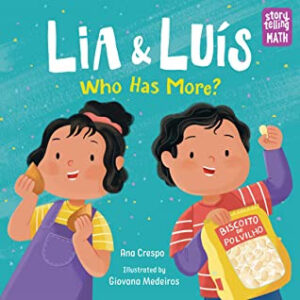 For Pre-Kindergarten, the Mathical Award Winner is Lia & Luís: Who Has More?, by Ana Crespo (Charlesbridge).
For Pre-Kindergarten, the Mathical Award Winner is Lia & Luís: Who Has More?, by Ana Crespo (Charlesbridge).
A brother and sister argue about who has the most snacks. They try counting and different ways of measuring the snacks to decide who really has more. Sometimes having the most is not having more.
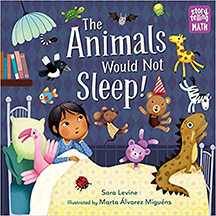 For Grades K–2, the Mathical Award Winner is The Animals Would Not Sleep, by Sara Levine (Charlesbridge).
For Grades K–2, the Mathical Award Winner is The Animals Would Not Sleep, by Sara Levine (Charlesbridge).
Marco has a problem. It’s time for him to get ready for bed, but his stuffed animals are not ready. There’s always one that is unhappy no matter how he categorizes them. Will they ever be satisfied so he can go to sleep?
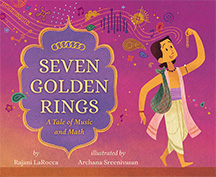 For Grades 3–5, the Mathical Award Winner is Seven Golden Rings: A Tale of Music and Math, by Rajani LaRocca (Lee & Low Books).
For Grades 3–5, the Mathical Award Winner is Seven Golden Rings: A Tale of Music and Math, by Rajani LaRocca (Lee & Low Books).
Bhagat wants to win the opportunity sing at the Rajah’s court. He must solve a math problem in order to make his family’s resources last until he can sing for the Rajah. In the end it is Bhagat’s math abilities not his musical talents that impress the Rajah.
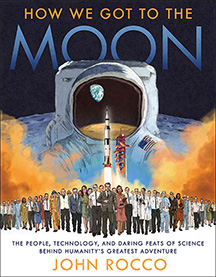 For Grades 6–8, the Mathical Award Winner is How We Got to the Moon: The People, Technology, and Daring Feats of Science Behind Humanity’s Greatest Adventure, by John Rocco (Crown Books)
For Grades 6–8, the Mathical Award Winner is How We Got to the Moon: The People, Technology, and Daring Feats of Science Behind Humanity’s Greatest Adventure, by John Rocco (Crown Books)
This amazing expository book explains the science behind the Apollo 11 Space Mission and introduces some of the people whose work contributed to the first lunar landing.
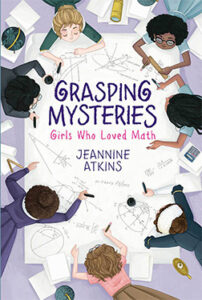 For Grades 9–12, the Mathical Award Winner is Grasping Mysteries: Girls Who Loved Math, by Jeannine Atkins (Simon & Schuster)
For Grades 9–12, the Mathical Award Winner is Grasping Mysteries: Girls Who Loved Math, by Jeannine Atkins (Simon & Schuster)
This thoroughly researched, elegantly written collective biography-in-verse introduces seven women who used math to make major contributions to the world. The biographical subjects include Caroline Herschel, Vera Rubin, Florence Nightingale, Hertha Marks Ayrton, Marie Tharp, Katherine Johnson, and Edna Lee Paisano.
2021 Honor Books
PreK
- One is a Piñata: A Book of Numbers, by Roseanne Greenfield Thong (Chronicle Books)
- One Happy Tiger, by Catherine Rayner (Tiger Tales Books)
- Animal Shapes, by Christopher Silas Neal (Little Bee Books)
Grades K–2
- Billions of Bricks: A Counting Book about Building, by Kurt Cyrus (Henry Holt)
- Bird Count, by Susan Edwards Richmond (Peachtree)
- Counting the Stars: The Story of Katherine Johnson, NASA Mathematician, by Lesa Cline-Ransom (Simon & Schuster)
Grades 3–5
- Numbers in Motion: Sophie Kowalevski, Queen of Mathematics, by Laurie Wallmark (Creston Books)
- Pass Go and Collect $200: The Real Story of How Monopoly Was Invented, by Tanya Lee Stone (Henry Holt)
Grades 6–8
- Can You Crack the Code?: A Fascinating History of Ciphers and Cryptography, by Ella Schwartz (Bloomsbury Children’s Books)
Grades 9–12
- David Blackwell and the Deadliest Duel, by Robert Black (Royal Fireworks Press)
- It’s a Numberful World: How Math Is Hiding Everywhere, by Eddie Woo (The Experiment Publishing)
Many of these books, as well as previous years’ winners, are available on this list on Bookshop.org. Purchases made using this link will provide a small commission to NCTE and independent bookstores.
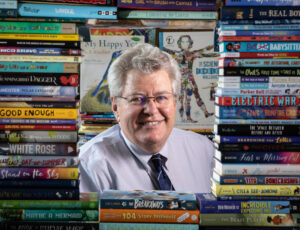
Terrell Young was a member of the 2021 Mathical Book Prize selection committee. He teaches children’s literature at Brigham Young University in Provo, Utah.
It is the policy of NCTE in all publications, including the Literacy & NCTE blog, to provide a forum for the open discussion of ideas concerning the content and the teaching of English and the language arts. Publicity accorded to any particular point of view does not imply endorsement by the Executive Committee, the Board of Directors, the staff, or the membership at large, except in announcements of policy, where such endorsement is clearly specified.

